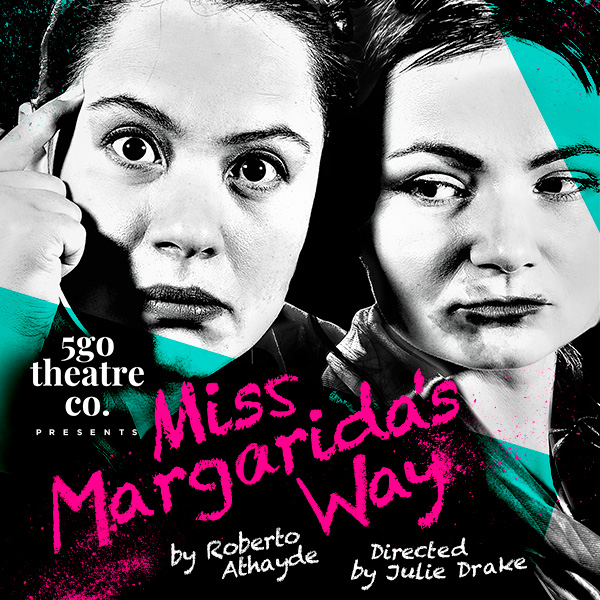Brighton Fringe 2023

Miss Margarida’s Way
5Go Theatre

Genre: Absurd Theatre, Dark Comedy, European Theatre, Farce, Fringe Theatre, International, Mainstream Theatre, Political, Satire, Theatre
Venue: The Actors- Theatre
Festival: Brighton Fringe
Low Down
Miss Margarida is your new teacher and you had better listen to her. That this is so is apparent right from the start of this powerful play.
Review
The fact that there were two Miss Margaridas almost left you punch-drunk in certain parts of the play. In the original play there is just one, but this was a magnificent way of doubling the power of the performance.
The two Margaridas speak in unison at first – it cements the conceit that they are both the same character. They are our new teacher.
Then follows the first lesson: part harangue, part inquisition, part didacticism, part moral instruction, part biology. Let’s be clear for one thing there’s no education going on here as viewed from a liberal arts perspective – why that could lead to disobedience.
The Margaridas occasionally break out of their strict tight school mistress persons to swear and abuse the class, just as the Johnsons and Rees-Moggs of this world occasionally let their guard fall and speak with their true contempt for anybody who is not part of their crew. It’s a stinging and uncomfortable reference to the real world of coercive rule.
It’s uncomfortable being in the audience- in a good way – in the sense that these are powerful actors delivering coruscating instructions, insults and blatant untruths amidst sickly homilies about how school is your family, and they love you and want the best for you.
The two Margaridas are played to a taut pitch-perfect picture of revelling in the power of the classroom, reinforced by repressed emotion. As an audience you feel as if you are in the headmistresses’ study, caught and about to be punished for countless unknown crimes of disobedience.
It’s an intense lesson in the contradictions of dictatorship, the sheer nastiness of the stuff you have to obey as against the lie that you are loved for, cared for, that this is all for the best for you and everybody. There is one pupil (Hugo Linton) on the stage with the Margaridas, mainly silent at his desk in the corner, who is alternately abused or caressed and kissed, but who is, essentially, treated as a nobody.
Hanna Luna and Leena Makoff are always deeply ensconced in their twisted character. A couple tried to shuffle into the performance late, they were pounced on mercilessly by the nearest Margarida, “How dare you interrupt my class, sit or get OUT now!” The hapless couple just turned and fled and we didn’t see them again!
But back to the actual lesson – it was mainly biology, you’re born – no choice there, there’s a middle (spoken of sneeringly) and then you die.
A lot of the things that are supposed to be learnt are written on the white board. “ You will die” is written up, then, strangely, despite the repeated assertion that there will No sex education , No facts of life, Miss Margarida draws what appears to be a giant graffiti style cock and balls on the board. “This is the cape of South Africa” says one Miss Magerida and you realise that it was just your dirty mind – but no! The other Miss Magerida is finishing off the illustration, putting the individual hairs on a hairy pair of balls, ejaculate spurting from the end of the cock.
It was a brilliant surreal demonstration of the confidence of right-wing dialogue to say something diametrically opposed to what is really going on, while the reality of the situation – the cock and balls – is plain to see.
It’s also a wry and directly relevant reflection on various egregious right-wing policies that seek to prevent even the simplest of sex education happening in any school.
It would be easy to dismiss this play as agit-prop until you’ve seen it. It’s not just a simplistic statement that dictatorships are bad, it’s a deep analysis of how warped a dictatorship has to be to fulfil its goals, about how people are led to believe such things. When you’re in the classroom that is your world, your teachers are defining all aspects of how you think act and behave, and it’s in these cocooned bubbles of misdirection and coercion that dictatorships maintain their tenacious hold on what people feel and think.
The staging on the play is masterful – it’s well paced, full of variety in pitch and action, full of call backs: repeated questions to the class, that take on a more sinister tone every time they are spoken again. The audience is always attentive with a double-edged reason – first it’s great to watch and secondly wo betide anybody who doesn’t pay attention to Miss Magarida.
It is a visceral emotional experience – you are almost on the edge of your seat with the tension and sheer force of the Miss Magarida’s speech and actions, you don’t have a lot of time to think. It’s in the hours after the show you begin to untangle the portrayal of the means of manipulation and coercion that the Mageridas demonstrated in front of you, and upon you.
Miss Magarida’s Way was both engrossing, challenging and incredibly entertaining. A muscular production that filled your attention all the time. It was supple and well produced, by Julie Drake, raising all sorts of thoughts and questions without being didactic and it did full justice to Roberto Athayde’s script.


















































